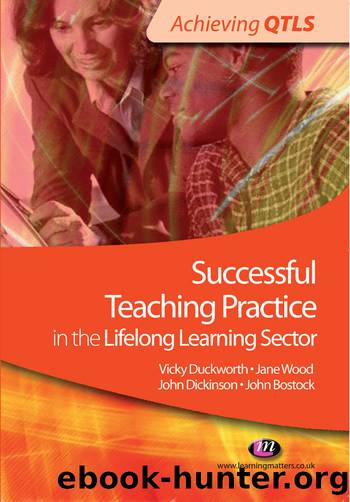Successful Teaching Practice in the Lifelong Learning Sector by Duckworth Vicky;Wood Jane;Bostock John;Dickinson John;

Author:Duckworth, Vicky;Wood, Jane;Bostock, John;Dickinson, John;
Language: eng
Format: epub
Publisher: SAGE Publications, Limited
Engaging learners
Young people experience a barrier to learning when something else occupies their minds, preventing them from focusing the necessary attention on what is to be learnt. There are many different things that can cause young people to get distracted or disengaged from learning and it is your job to manage the learning experience but it is difficult to manage any situation unless you take accurate notice of what is happening with your learners and the dynamics in the classroom.
Lessons need to be well structured and planned to engage learners in the learning, activities should be interesting, varied and valuable and the objectives for each activity should be shared with the learners. Learners are less likely to misbehave if they are engaged and working hard and behaviour for learning encourages you to take time and effort in the planning of interesting sessions that are enjoyable and that ensure learning is taking place.
Lecturers are also responsible for ensuring equality and fairness in the classroom. All students must feel that they are positively and equally valued and accepted, and that their efforts to learn are recognised, and judged without bias (Petty, 2004, p81).
The second key factor in behaviour for learning is to make sure students are always engaged in their learning and that work is neither to easy nor too difficult. Differentiation is essential to ensure that the needs of all learners are planned for and work is suitable for all learners. Differentiation is adopting strategies that ensure success in learning for all, by accommodating individual differences of any kind (Petty, 2004, p541).
Learners in FE are very diverse, therefore using a wide range of resources will engage and motivate them and meet the range of their needs. There are many differences between learners that affect their learning. Differentiation is about coping with these differences and using them to promote learning. Differentiated learning takes into account that your learners may differ in terms of their motivation, prior experience and knowledge, learning support needs, cultural expectations, literacy, language, numeracy and ICT levels and their learning preferences. It is important to develop resources that cover more than one level of difficulty, use different media or give your learners choices of how to complete tasks and provide learning support where necessary.
Differentiation enables all learners to participate in learning and reduces the chance of challenging behaviour occurring. This personalisation of learning is very important and ensures that learners feel valued and supported. Working in the FE sector requires a commitment from lecturers to adopt an ethos where every learner matters and every learnerâs learning needs are accommodated as far as is practical and possible.
Download
This site does not store any files on its server. We only index and link to content provided by other sites. Please contact the content providers to delete copyright contents if any and email us, we'll remove relevant links or contents immediately.
Spare by Prince Harry The Duke of Sussex(5176)
Navigation and Map Reading by K Andrew(5150)
Tuesdays with Morrie by Mitch Albom(4769)
Machine Learning at Scale with H2O by Gregory Keys | David Whiting(4292)
Cracking the GRE Premium Edition with 6 Practice Tests, 2015 (Graduate School Test Preparation) by Princeton Review(4279)
Never by Ken Follett(3937)
Goodbye Paradise(3798)
What It Really Takes to Get Into Ivy League and Other Highly Selective Colleges by Hughes Chuck(3745)
Fairy Tale by Stephen King(3370)
Harry Potter and the Prisoner of Azkaban (Book 3) by J. K. Rowling(3347)
Pledged by Alexandra Robbins(3170)
Kick Ass in College: Highest Rated "How to Study in College" Book | 77 Ninja Study Skills Tips and Career Strategies | Motivational for College Students: A Guerrilla Guide to College Success by Fox Gunnar(3117)
Reminders of Him: A Novel by Colleen Hoover(3092)
A Dictionary of Sociology by Unknown(3073)
Sapiens and Homo Deus by Yuval Noah Harari(3065)
The Social Psychology of Inequality by Unknown(3018)
Will by Will Smith(2908)
Graduate Admissions Essays, Fourth Edition: Write Your Way into the Graduate School of Your Choice (Graduate Admissions Essays: Write Your Way Into the) by Asher Donald(2907)
Zero to Make by David Lang(2778)
